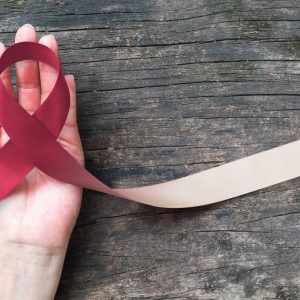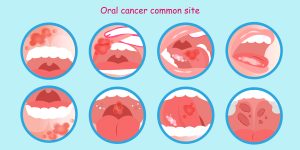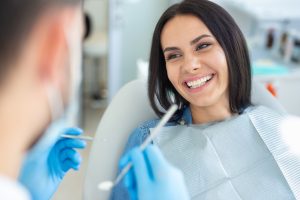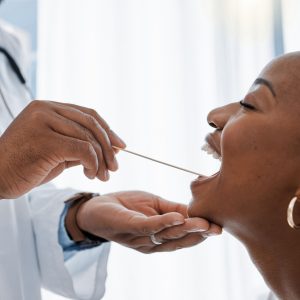Protect Your Health with Oral Cancer Screenings
Regular oral cancer screenings are a vital component of maintaining your oral and overall health. Led by West Sayville dentist, Dr. Richard Sigismondi, we place great emphasis on early detection and prevention. In this comprehensive guide, we’ll explore the significance of regular screenings for oral cancer. Learn why oral cancer screenings are so important to your oral and overall health, and how our Long Island dental practice can help you stay healthy by dialing 631-563-1583.
Oral Cancer Definition
Oral cancer is an uncontrolled growth of malignant cells within the tissues of the oral cavity, which includes the lips, tongue, gums, cheeks, and the roof and floor of the mouth. It can also affect the oropharynx, which is the area of the throat just behind the mouth.
Symptoms of Oral Cancer
Oral cancer can manifest through various signs and symptoms, indicating the need for timely medical evaluation. Common symptoms associated with oral cancer include the following:
- Persistent mouth sores that don’t heal
- Swelling, lumps, or thickening of the lips, gums, or other areas within the mouth
- White or red patches on the gums, tongue, tonsils, or lining of the mouth
- Unexplained bleeding in the mouth
- Difficulty or pain while chewing, swallowing, or speaking
- Persistent sore throat or feeling of something being stuck in the throat
If you suspect you have any of the symptoms listed above, contact our West Sayville dental practice and schedule your oral cancer screening. Dr. Sigismondi has the tools and the skills necessary to detect possible issues and get you started on your treatment as soon as possible.
What Are Oral Cancer Screenings?
Oral cancer screenings involve a thorough examination of the mouth, including the lips, tongue, gums, cheeks, and throat, to identify any signs of cancer or precancerous conditions. Dr. Sigismondi provides screenings for oral cancer as part of every routine exam because early detection of oral cancer greatly increases the chances of successful treatment.
Benefits of Oral Cancer Screenings
Early Detection
Detecting oral cancer in its early stages improves treatment outcomes and increases the likelihood of a full recovery. Regular screenings allow for the identification of any suspicious lesions or abnormalities that may indicate the presence of oral cancer.
Preventive Measures
Identifying precancerous lesions during screenings for oral cancer allows for proactive intervention. By detecting these early warning signs, healthcare professionals can take necessary steps to prevent the development of full-blown cancer. This can include monitoring the lesions closely, performing biopsies, or recommending further treatment options.
Peace of Mind
Regular screenings provide peace of mind, knowing that your oral health is being closely monitored by a professional. By staying proactive and vigilant about your oral health, you can have confidence in the early detection and prevention of oral cancer.
Improved Treatment Outcomes
Early detection through regular screenings can significantly improve treatment outcomes for oral cancer. With early intervention, healthcare professionals can develop personalized treatment plans that may include surgery, radiation therapy, chemotherapy, or a combination of these approaches. By catching oral cancer in its early stages, the chances of successful treatment and a positive prognosis are greatly increased.
Reduced Risk of Complications
Regular oral cancer screenings can help reduce the risk of serious complications associated with advanced-stage oral cancer. By detecting the disease early, healthcare professionals can intervene before it spreads to other parts of the body, reducing the need for more invasive and aggressive treatments
The Oral Cancer Screening Process
Visual Examination
Dr. Sigismondi will perform a visual inspection of your oral cavity, including the lips, tongue, cheeks, gums, and throat. He will look for any unusual growths, discolorations, or other abnormalities.
Physical Palpation
During this step, your family dentist will gently feel around your mouth and neck to check for any lumps, masses, or areas of tenderness.
Use of Special Tools
Dr. Sigismondi may use specialized instruments to examine your mouth more closely. These tools can help detect abnormalities that may not be visible to the naked eye. Special tools used for oral cancer screenings may include the following:
- Oral Screening Dyes: Specialized mouth rinses or dyes may be used to help identify abnormal cells or lesions in the mouth. These dyes can make it easier to detect any areas of concern during the visual examination.
Lights: Certain types of lights, such as fluorescent lights or specialized devices may be used to enhance the visibility of abnormal tissues or lesions that may not be easily visible to the naked eye.
Biopsy
If any suspicious areas are detected during the screening, a biopsy may be recommended. A small tissue sample will be taken and sent to a laboratory for analysis to determine if cancer is present.
Frequently Asked Questions
Everyone should consider getting regular oral cancer screenings, especially those who use tobacco products, consume alcohol excessively, have a family history of cancer, or have previously been diagnosed with oral cancer.
Yes, oral cancer screenings can also help identify other oral health concerns, such as infections, inflammation, and precancerous lesions. Regular screenings are an integral part of maintaining overall oral health.
The frequency of oral cancer screenings can vary based on individual risk factors. In general, it’s recommended to have a screening at least once a year during your regular dental check-up.
Yes, certain risk factors increase the likelihood of developing oral cancer. These include tobacco use (including smoking and smokeless tobacco), excessive alcohol consumption, a history of oral cancer, prolonged sun exposure to the lips, and infection with human papillomavirus (HPV).




